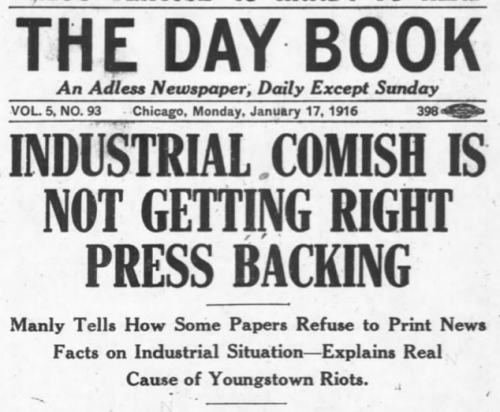Hellraisers Journal: Basil Manly of Walsh Commission Explains Real Cause of Youngstown Riots
Put on your fighting clothes.
-Mother Jones
~~~~~~~~~~~~~~~~~~~~~~~~~~~~~~~~~~~~~~~~~~~~~~~~~~~~~~~~~~~~~~~~~~~~~~~~~~~~
Tuesday January 18, 1916
Chicago, Illinois - Basil Manly Speaks Out Regarding Youngstown Riots
From the Chicago Day Book of January 17, 1916:
The whole steel industry is ripe for a strike. Strikes will come with increasing violence unless--
A further wage increase of 20 per cent is granted, an eight-hour day is established and the system of industrial terrorism, established by the steel trust among its 230,000 slaves, is abolished.
This is part of the report of George West, a former newspaper man, to Basil Manly, secretary of the U. S. committee on industrial relations, who unfolded it to the Chicago Federation of Labor yesterday.
Manly asked the federation to appoint a Chicago committee on industrial relations and that this body co-operate with the central organization at Washington. After his talk Pres. John Fitzpatrick was instructed to do this.
Manly said:
The main committee is reaching 2,000 newspapers. Some of the papers have refused to publish the facts we have sent them. The ammunition in this fight is facts and truth. The committee I am asking you to appoint will exchange information of local conditions for information of national commissions with the Washington body. It will serve to keep you in touch with your movement. This afternoon 100 other central bodies are taking this step. Within a month a thousand such committees will have been appointed.
Frank P. Walsh, chairman of the committee, had accepted an invitation to speak before the federation. When he found he could not come he sent Manly. Manly told the federation how the committee is fighting to get the report published. He told how an organization of "minute men" is being formed so the committee could have an investigator at the seat of any industrial trouble at a minute's notice. Then he read to the federation the report of West telling the cause of the Youngstown strike "riots."
The Youngstown strike was not caused by Wall street manipulators or foreign agents, says the, report. It was the natural outcome of brutalized wage slaves, who, for the first time in their lives found they could quit a job without starving. There is every reason to believe that the 10 per cent increase, announced by Judge Elbert Gary to go into effect Feb. 1, was brought about by the strike. Immigration has permitted the steel trust, up to this time, to have two workers for every job. Although the strike was against two corporations not connected with the U. S. Steel Corporation the full responsibility lies with the latter. The heads of both the Republic Iron & Steel Co. and the Youngstown Sheet Tube Co. admitted to West that their wages were governed by those paid by the U. S. Steel Corporation.
The strikers didn't only take Jewelry, but they took food, clothing and children's shoes, continues West. All of the account books of the butchers and grocers, to whose these laborers owed enormous amounts, were burned along with the postoffice records, which contained six postal saving accounts from the 9,000 "slaves" of Youngstown.
West reports that East Youngstown is an "industrial hell hole." He says the saloon interests control the city and that of the 9,000 population there are only 450 voters. There is not a church in the city.
He says the workers were bound in an industrial and economic slavery. That in the years of 1907 and 1908 and in 1913 and 1914 and the first nine months of 1915 the men were given three to five days' work a week and that married men were given the preference. Conditions became so bad among the employes of the Youngstown Sheet & Tube Co. that the company organized its own relief department and deducted the aid given from the pay of the men when they came back to work.
The men worked 12 hours a day and 7 days a week when they worked at all. In the last year only 58 per cent of the men have managed to earn as much as $600 a year ($12 a week) and the U. S. labor bureau says it takes $700 a year to live decently.
Organized charity is the same in Youngstown as elsewhere. West interviewed J. N. Hanson, sec'y of the charity organization society there. Hanson told him that low wages had nothing to do with the horrible conditions. He blamed the situation on drink and bad management.
[Said Manly:]
This is the report of one of the minute men. There will be other reports of other outbursts.....The U. S. industrial relations committee was formed to continue the work of the commission. The report of the commission was labor's declaration of independence. It was compiled by us on the information furnished mainly by you. We want it published and acted upon. So far no one has dared oppose it.
[Photograph of Basil Manly added.]
SOURCE
The Day Book
(Chicago, Illinois)
-Jan 17, 1916
http://chroniclingamerica.loc.gov/lccn/sn83045487/1916-01-17/ed-1/seq-1/
IMAGES
Day Book, Headline, Manly of CIR on Youngstown, Jan 17, 1916
https://www.newspapers.com/image/77793579/
Basil M Manly, Director of Research for CIR, Day Book, Aug 13, 1915
http://www.newspapers.com/image/77854180/
See also:
The New Republic
(New York, New York)
-Jan 29, 1916
pdf! https://www.unz.org/Pub/NewRepublic-1916jan29-00316?View=PDF
"Youngstown" by George P West
https://www.unz.org/Pub/NewRepublic-1916jan29-00330?View=PDF
``````````````````````````````````````````````````````````````````````````````````````````````````
There Is Power in a Union - Billy Bragg



